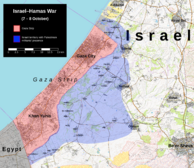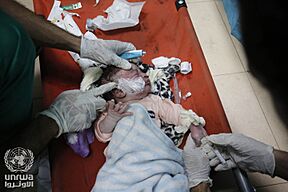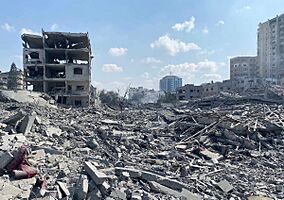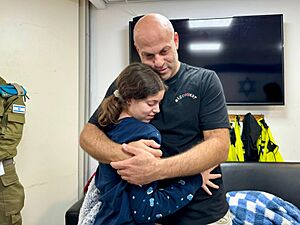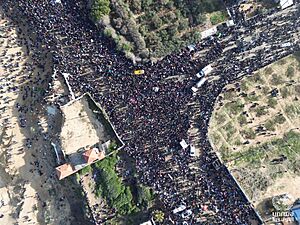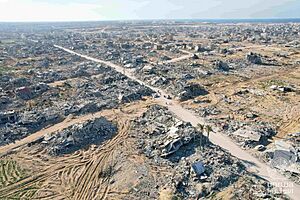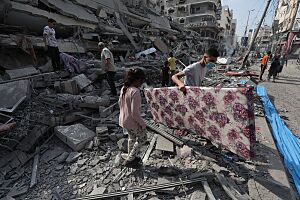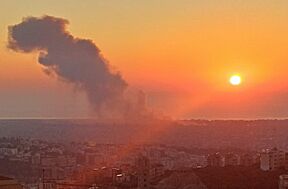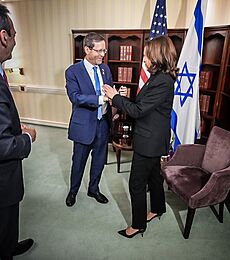Gaza war facts for kids
The Gaza war is an armed conflict between Israel and Palestinian militant groups led by Hamas. It began on October 7, 2023. The fighting takes place mainly in the Gaza Strip and Israel. This war is part of the long-running Israeli–Palestinian conflict.
The war started when Hamas launched a surprise attack on Israel. During the attack, about 1,200 Israelis and foreign nationals were killed. Another 251 people were taken to Gaza as hostages. Hamas said it did this to force Israel to release Palestinian prisoners.
In response, Israel launched a military operation in Gaza. Its goals were to defeat Hamas and rescue the hostages. Since the war began, over 59,000 Palestinians in Gaza have been killed. More than half of them were women and children. Over 143,000 people have been injured.
Israel's actions led to a major humanitarian crisis in Gaza. A blockade by Israel cut off supplies like food, water, and fuel. This caused severe hunger and a high risk of famine. Large parts of Gaza have been destroyed, including homes, hospitals, and schools. Nearly all of Gaza's 2.3 million people have been forced to leave their homes.
The war is the deadliest for both Israelis and Palestinians in their long history of conflict. Many countries and organizations have been involved in trying to find a peaceful solution. The war has also caused tensions to rise across the Middle East.
Contents
Background of the Conflict
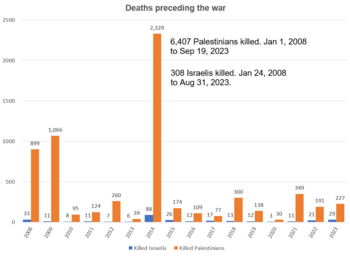
The conflict between Israelis and Palestinians has deep roots. In 1948, the State of Israel was created. This led to a war that left two Palestinian territories, the West Bank and the Gaza Strip, under the control of Jordan and Egypt. In 1967, Israel occupied both of these territories after the Six-Day War.
Since 2007, the Gaza Strip has been governed by Hamas, a Palestinian militant group. The West Bank is run by the Palestinian Authority. After Hamas took control, Israel and Egypt placed a blockade on Gaza. They said this was for security reasons. The blockade severely hurt Gaza's economy and created difficult living conditions for its people.
Before this war, there were other major conflicts between Israel and Hamas in 2008, 2012, 2014, and 2021. Hamas officials said their October 7 attack was a response to the Israeli occupation, the blockade, and the treatment of Palestinians.
The War Begins
Hamas Attacks Israel
- Map showing the situation on October 7–8
- A blood-stained floor after an attack
- Damage at a hospital in Israel
- Satellite view of fires in Israel near Gaza
- Israeli soldiers at the site of the Nova music festival massacre
On the morning of October 7, 2023, Hamas launched "Operation Al-Aqsa Flood." They fired thousands of rockets from Gaza into Israel. At the same time, about 3,000 militants broke through the border fence. They attacked Israeli towns and military bases.
The militants attacked civilians in several communities. At a music festival near Re'im, at least 325 people were killed. In total, 251 people, including children and the elderly, were taken as hostages to Gaza. The attack was the deadliest single day in Israel's history.
Israel's Response
- A Palestinian baby is treated after an Israeli airstrike.
- A man carries his injured grandchildren.
- A building in Gaza is destroyed by an Israeli missile.
- Damage in Gaza City after an airstrike.
- Injured Palestinians, including children, at a hospital.
Israel's Prime Minister, Benjamin Netanyahu, declared that the country was at war. The Israeli military, called the Israel Defense Forces (IDF), began a massive bombing campaign in Gaza. Israel also announced a "complete siege" of Gaza. This cut off electricity, food, and fuel supplies.
On October 13, the IDF ordered all civilians in northern Gaza to move to the south. This order affected over one million people. Many found it impossible to leave. As people tried to flee, some evacuation routes were attacked.
On October 27, the IDF began a ground invasion of northern Gaza. The fighting was intense. Israeli forces entered cities and refugee camps, leading to many casualties.
Major Events During the War
First Ceasefire and Hostage Exchange
In November 2023, a temporary ceasefire was agreed upon. It was brokered by Qatar. During the four-day pause in fighting, Hamas released 50 hostages. In return, Israel released 150 Palestinian prisoners. The truce was extended for a few days to allow more exchanges, but it ended on December 1.
Fighting Moves South
After the truce ended, Israel expanded its military operations to southern Gaza. The fighting focused on cities like Khan Yunis. The bombing pushed many displaced Palestinians further south to the city of Rafah, near the border with Egypt.
By early 2024, over a million people were crowded into Rafah. They lived in terrible conditions with little food, water, or shelter.
The Rafah Offensive
In May 2024, Israel began its offensive in Rafah. This was despite warnings from many countries, including the United States. The IDF ordered people in eastern Rafah to evacuate. The invasion of Rafah made the humanitarian crisis even worse. It also closed a key border crossing for aid.
On May 26, an Israeli airstrike hit a camp for displaced people in Rafah. The attack caused a large fire and killed at least 45 people. This event caused outrage around the world.
Second Ceasefire and Renewed Fighting
A second ceasefire began in January 2025. It included another exchange of hostages and prisoners. However, the ceasefire ended in March 2025. Israel launched a surprise attack across Gaza, saying Hamas had not agreed to extend the truce.
The fighting resumed with great intensity. Israeli forces launched new operations across Gaza, including in areas they had previously left.
Humanitarian Crisis in Gaza
The war has caused a terrible humanitarian crisis. The blockade and fighting have led to extreme shortages of basic necessities.
- Hunger and Famine: Lack of food has caused widespread hunger. Aid organizations warned that parts of Gaza were facing famine. Airdrops and a temporary sea port were set up to deliver aid, but they were not enough to meet the needs.
- Healthcare Collapse: Most of Gaza's hospitals have been damaged or destroyed. Those still open are overwhelmed with patients and lack supplies. Many doctors, nurses, and aid workers have been killed.
- Displacement: Almost the entire population of Gaza, 2.3 million people, has been forced from their homes. Many live in overcrowded tents or shelters with poor sanitation.
- Destruction: Satellite images show that over half of the buildings in Gaza have been damaged or destroyed. This includes homes, schools, universities, and cultural sites. The level of destruction is among the most severe in recent history.
The War's Wider Impact
- Smoke rises after an Israeli strike on Hezbollah headquarters in Lebanon.
- A damaged building in northern Israel.
- Two United States aircraft carriers in the Mediterranean Sea.
The Gaza war has affected the entire Middle East region.
- Lebanon: The militant group Hezbollah, based in Lebanon, began firing rockets at Israel. This was in support of Hamas. Israel responded with airstrikes. The fighting led to an Israeli invasion of southern Lebanon in late 2024.
- Red Sea: The Houthi movement in Yemen attacked ships in the Red Sea. They said this was to pressure Israel to end the war. The United States and its allies launched military strikes against the Houthis in response.
- West Bank: Violence also increased in the West Bank. Hundreds of Palestinians have been killed in clashes with Israeli forces and settlers.
- Iran: The conflict increased tensions between Israel and Iran. The two countries exchanged direct military strikes for the first time.
International Reactions
The war has divided the world. Israel's traditional allies, like the United States, the UK, and Germany, supported its right to defend itself. The U.S. has provided significant military and diplomatic support to Israel.
However, many other countries have criticized Israel's actions in Gaza. They have pointed to the high number of civilian deaths and the humanitarian crisis. Some countries, like Spain, Ireland, and Norway, officially recognized the State of Palestine.
There have been large protests in cities around the world. Many protesters have called for a ceasefire and more aid for Gaza.
The war has also led to legal challenges. South Africa accused Israel of committing genocide at the International Court of Justice (ICJ), the UN's top court. The court is reviewing the case. The International Criminal Court (ICC) also issued arrest warrants for leaders of both Israel and Hamas for actions that may break the rules of war.
Images for kids
-
Israeli Merkava tanks at the Rafah Border Crossing
-
West Bank sector of war
West Bank Palestinian enclaves (Areas A & B) West Bank under Israeli control (Area C) Israeli-annexed East Jerusalem -
US Secretary of State Antony Blinken and Israeli President Isaac Herzog in Tel Aviv, Israel, 9 January 2024
-
Rimal in Gaza City following an Israeli airstrike, 10 October 2023
-
US Secretary of State Antony Blinken and foreign ministers of the Gulf Cooperation Council member states in Riyadh, Saudi Arabia, 19 April 2024
See also
 In Spanish: Guerra de Gaza para niños
In Spanish: Guerra de Gaza para niños
 | Victor J. Glover |
 | Yvonne Cagle |
 | Jeanette Epps |
 | Bernard A. Harris Jr. |



